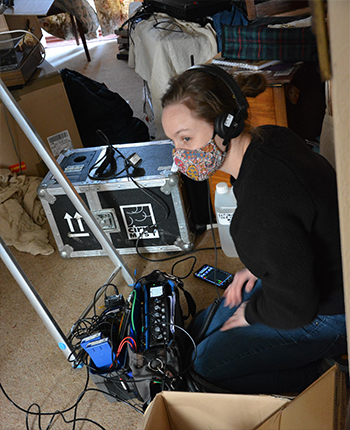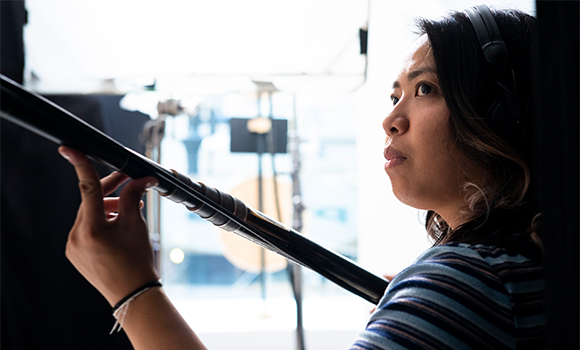What Is Location Sound Recording?
Sound in film and television is a critical part of the storytelling process. Whether it’s voices, music or sound effects the audio helps add layers to a production that contribute to the emotion, drama or story.
One of the vital roles on a film or television set is the Location Sound Recordist (also known as a Production Sound Mixer, Location Sound Engineer or Sound Mixer). This person is responsible for recording all sound on set during the production.

The NFTS runs a 15 month Location Sound Recording Diploma, the only one of its kind in the UK, developed in response to high industry demand for suitably trained production sound professionals.
We spoke to current student Annabelle Howell to see how she is enjoying the course and also to graduate Chi Limpiroj to get a different perspective and find out how it has helped her career since graduating in 2017.
Read on to discover if this could be the course for you...
What were you doing before choosing to study the NFTS Location Sound Recording Diploma?
Annabelle (current student): I had just moved back to the UK from the US where I was working in sound post-production. During the pandemic in 2020 I thought it was a good time to expand my skills, especially as I did not have much experience in location recording.

Chi (graduate): I had previously studied my undergrad in Music Technology and a Masters in Sound Design, though towards the end of my Sound Design course, I was persuaded to come on set to try some production sound recording as there was a lack of sound recordists around, and I instantly fell in love with being on set and haven’t looked back since. It was a lot of guesswork as I’d never been on set before, but I knew I wanted to learn more about it and do things properly as opposed to winging it each time and hoping for the best.
How did you find out about the Location Sound Recording course?
Annabelle: I grew up not too far from the NFTS so had known about it and its reputation for a long time. I found the Location Sound course on the school’s website and quickly requested more information, as it seemed really interesting!
Chi: I’d always known the NFTS was a brilliant film school with an excellent reputation, and when I was looking at Location Sound courses, the course at the NFTS was the only one I could find, so I applied and was thankfully accepted.

Annabelle, what has been your favourite project so far at the school and what did it entail?
Annabelle: Working on documentaries has been a new experience for me and I had the opportunity to work as the location mixer on one at the end of last year (2020) which was really fun and interesting. Documentary shooting really makes you more reactive to situations, as it’s sometimes harder to know how the day will pan out compared to shooting fiction.
What was it like studying the course for you Chi, and how did it equip you for your current career?
Chi: This course absolutely changed my life, I learnt so much. It’s such a hands-on course, you’re always busy working on short films, TV or documentaries, and constantly networking. All the gaps I had in my knowledge of sound were filled and I was able to work on projects more confidently, and I felt my tutors were very supportive and cared for each and every one of us, even after graduating. Going into the real world and working on bigger productions blindly would have been extremely overwhelming but having practiced so much at the film school, although it’s all on a bigger scale, I didn’t feel swamped or out of my depth on my jobs and quickly found my feet after graduating.
Can you tell us about any projects you’ve worked on/are working on and what your role was like?
Chi: I’ve been very lucky and worked almost constantly since graduating, once you get the ball rolling and make the right impression and some good contacts, everything just flows from there. I’ve worked on mostly high end TV dramas such as Code 404, Two Weeks to Live, Britannia, and one Netflix feature, The Old Guard, which are all very different in terms of size, pace and budget, therefore providing different experiences. I’ve learnt so much from each and every shoot, some of the jobs were more demanding than others which is good for keeping you on your toes, but overall I am still in awe that this is my job. My current job is quite relaxed, and potentially a bridge to stepping up to 2nd AS which I’m very excited about.

What would you both say to persuade someone who's thinking about applying to the course?
Annabelle: The course is great to improve your knowledge and practical experience with a variety of field recording equipment and microphones and their applications. There are also so many projects that happen throughout the year that there’s plenty of opportunity to put those skills into practice. The first few months are great to get the whole cohort up to speed and to the same level in terms of knowledge, even though everyone may have differing levels of practical, technical, or on set experience.
Chi: If you’re thinking about it, go for it! It’s the best decision I’ve ever made, and I had an absolute blast. I honestly couldn’t recommend it enough, the tutors are great, the amount of experience you get from working on different types of media platforms helps you narrow down what path you might want to take, great opportunities to meet new and extremely talented filmmakers with a range of top, up-to-date/industry standard kit to learn on, I would easily do it all again as I had so much fun.
Finally Annabelle, in what way do you feel the course will give you a launching pad to your future career?
Annabelle: As well as the theory and technical aspects of sound, we learn relationship building, i.e. how to collaborate with other departments, and how to contribute effectively to the pre-production process. So in that sense I really think I have a more holistic view of the sound department’s role in the filmmaking process, which is knowledge I’m glad to be taking with me from the course. Collaborating with others is a key part of training at the NFTS, so it’s a great place to learn from those training in different areas, and to create a network with other professionals.
Applications are open for the NFTS Location Sound Recording Diploma! Get industry standard training, taught exclusively by practising professionals, in the theory and practice of recording sound, on location and in our state-of-the-art 4K multi-camera television studio, along with Fisher Boom training and experience of in-studio music recording and post-production techniques.
Visit the course page and apply today!
nfts.co.uk/location-sound-recording-film-and-television

